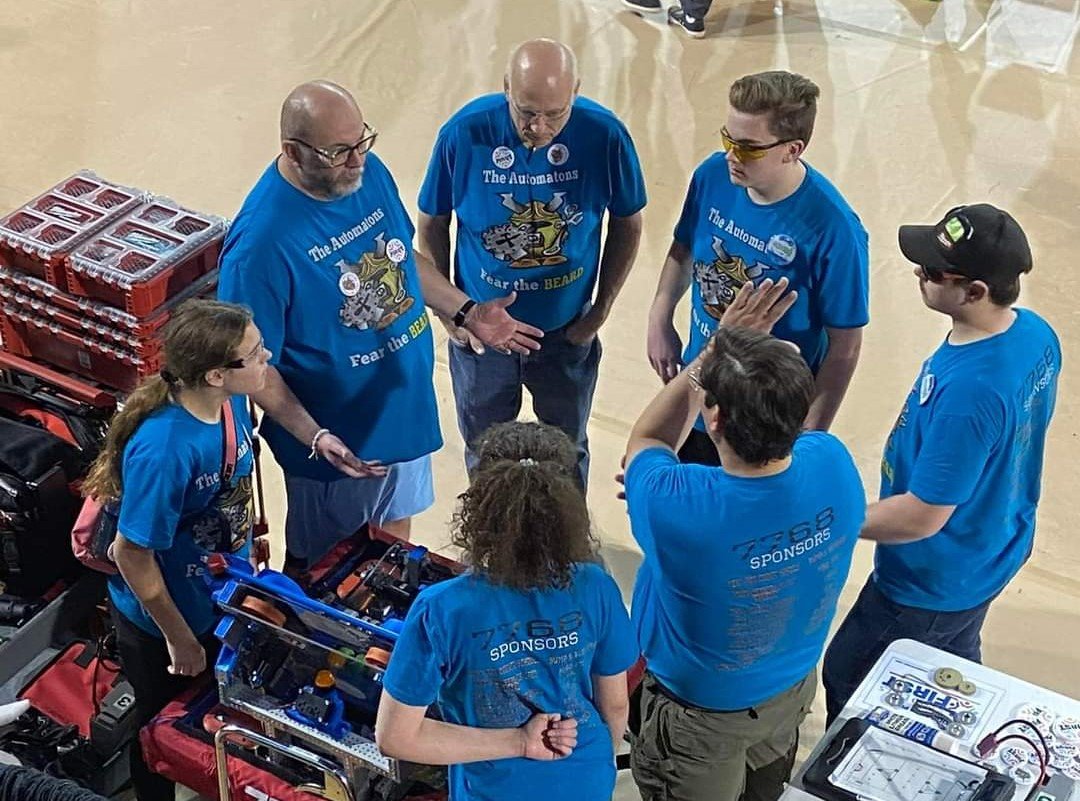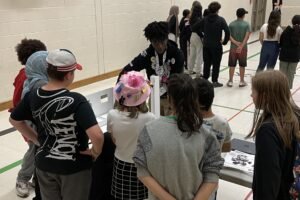How did StudentsFIRST.tech get started?
Robin Lee, the founder of StudentsFIRST.tech, has a rich background in robotics, having been a member of robotics teams since elementary school.
Robin’s journey took an unexpected turn when they were on Jack-in-the-Bot FRC Team 2910 and they privately expressed concerns about the dynamics between mentors and students on the team. Unfortunately, this led to Robin’s departure from the team.
However, this experience sparked a positive change. Robin recognized the need for a platform where students and adults could openly discuss challenges within the robotics community, particularly regarding the balance of mentor involvement and student autonomy.
Initially, Robin focused on the right to freedom of speech. However, it became evident that the issue extended beyond one team; it resonated with robotics teams nationwide. Many faced similar challenges, with overly involved adults sometimes hindering student learning and impacting the fairness of competitions.

In January 2024, StudentsFIRST.tech was established as a Washington state non-profit corporation to address these concerns in a constructive and collaborative manner. The organization aims to bring together like-minded individuals within the FIRST community to advocate for positive change and work towards solutions that benefit all involved.
Through education, dialogue, and a commitment to inclusivity, StudentsFIRST.tech seeks to create a supportive environment where both students and adults can thrive, ultimately enriching the robotics experience for everyone.

How Students Can Exercise Their Right to Free Speech: A Guide to Understanding Your Rights
Did you know that as a student, you have the right to freedom of speech? That’s right, the First Amendment protects your right to speak your mind, even while you’re in school.
According to the ACLU, you can express yourself by speaking out, handing out flyers, or wearing clothing with messages, as long as it doesn’t disrupt school activities or violate school policies unrelated to the message.
For example, you can wear clothing with messages like supporting LGBTQ+ rights or advocating for peace. Even outside of school, you still have the right to express yourself, including on social media.
The Supreme Court confirmed this in the Tinker v. Des Moines case, stating that students don’t lose their constitutional rights at the school gate. So, feel confident in speaking your mind and standing up for what you believe in!
Empowering Student Learning in Robotics Teams

In robotics teams, the spotlight should shine on student education, not just winning competitions. Students should dive into learning, with mentors and coaches guiding them every step of the way. According to FIRST Robotics, mentors and coaches play a crucial role in guiding, supporting, and inspiring students, nurturing not only technical skills but also critical thinking, problem-solving, and teamwork.
Mentors and coaches are like guiding stars, sharing their knowledge in designing and building robots, teaching programming, and introducing engineering concepts. Their wisdom empowers students to explore their potential in robotics.
But they’re more than just teachers; they’re role models too. They lead by example, showing professionalism, dedication, and a passion for STEM fields. Through their enthusiasm, they ignite students’ interest in engineering, robotics, and related careers.
And it’s not just about robots—it’s about life skills too. Effective communication, time management, and teamwork are essential not only for robotics success but also for life.
Mentors and coaches create a supportive space where students can build confidence, resilience, and leadership skills.
In short, robotics teams should put student education front and center. By prioritizing learning, guiding students, and fostering a nurturing environment, teams can help students grow not only in technical skills but also in critical thinking and overall development.

Embracing FIRST's Values: Guiding Students Towards Success
In the world of FIRST robotics, two values stand out: Gracious Professionalism and Coopertition. These values are all about mentors guiding and supporting students as they learn and grow.
Mentors play a big role in helping students develop technical skills and problem-solving abilities. They offer advice based on their own experiences, helping students tackle challenges and make smart decisions. But it’s not just about technical stuff—mentors also create a positive environment where students feel empowered to take charge of their projects.
At the same time, it’s crucial for mentors to let students get their hands dirty. FIRST robotics is all about hands-on learning, where students can apply what they’ve learned in real-world situations. By actively participating in building robots, students deepen their understanding of concepts and gain practical skills for their futures. Plus, it boosts their confidence when they see their ideas come to life.
But it’s not just about robots—it’s about life skills too. Through teamwork, communication, and leadership, mentors help students grow into well-rounded individuals ready to tackle anything life throws their way.
So, by guiding students while giving them room to shine, mentors are not just teaching robotics—they’re shaping future leaders in STEM and beyond.
Ideas for CHANGE
Exploring Solutions: Fostering Fairness and Learning in Robotics Leagues
 One idea to improve robotics teams is creating two leagues: “A” for students and adults with limited adult involvement, and “B” for adults, with or without student participation. This approach aims to tackle issues like excessive adult control and students missing out on learning opportunities.
One idea to improve robotics teams is creating two leagues: “A” for students and adults with limited adult involvement, and “B” for adults, with or without student participation. This approach aims to tackle issues like excessive adult control and students missing out on learning opportunities.
In the “A” League, adults are capped in their involvement, ensuring students lead the way. This promotes fair competitions and encourages students to learn and grow. Meanwhile, the “B” League provides a space for enthusiastic adults to continue building robots and stay connected with the FIRST community.
This solution also addresses concerns about fund misuse. Some districts invest heavily in robotics, benefiting adults more than students. By capping adult involvement, resources can be redirected to programs that truly benefit students.
Another idea is to limit mentor involvement, though enforcement may be tricky. FIRST could set rules like mentors building only a portion of the robot or allowing only student hands on the robot or keyboard. Learning-focused teams prioritize teaching students skills and self-sufficiency over adult intervention.
These proposals aim to create fairer, more educational robotics experiences for students, empowering them to lead and learn in the exciting world of robotics.
Coaches and mentors are vital to the success of FIRST robotics teams

Guidelines for Coaches and Mentors: Fostering Respect and Learning in FIRST Robotics Teams
Coaches and mentors are vital to the success of FIRST robotics teams, guiding students in their learning journey. To ensure a positive and inclusive environment, we’ve outlined these guidelines:
1. Prioritize Student Learning: Focus on students’ growth by involving them in every aspect of the program, from design to problem-solving.
2. Encourage Open Communication: Create a space where students feel safe sharing ideas and concerns. Listen actively and work together to find solutions.
3. Respect Personal Boundaries: Treat every student with dignity and respect, respecting their physical, emotional, and mental well-being.
Manage Conflicts Effectively: Address conflicts promptly and fairly, promoting peaceful resolutions.
4. Facilitate Skill Development: Guide students in developing technical and problem-solving skills, empowering them to take charge of their learning.
5. Collaborative Decision Making: Foster open communication and involve students in decision-making processes.
6. Encourage Active Participation: Engage students in all aspects of robot design and programming, valuing their contributions.
7. Lead by Example: Demonstrate positive attitudes, ethical behavior, and professionalism, serving as role models for students.
8. Provide Learning Opportunities: Offer workshops and resources to enhance students’ skills and encourage self-improvement.
9. Empower Team Leadership: Enable students to take on leadership roles, promoting teamwork and self-confidence.
10. Disperse Responsibilities and Opportunities: Ensure fair access to leadership positions and learning opportunities for all students.
11. Regularly Assess Student Progress: Monitor students’ progress and provide feedback to support their growth.
12. Regularly Assess Coach and Mentor Involvement: Students should evaluate coach and mentor involvement to ensure a student-focused approach.
13. Show Kindness and Respect: Treat students with kindness and respect, creating an atmosphere where their voices are valued.
14. Maintain Professional Boundaries: Uphold appropriate boundaries to ensure a safe and respectful learning environment.

